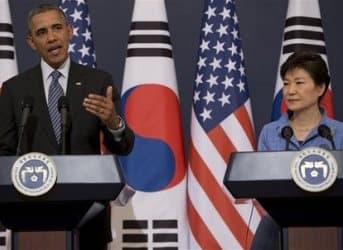Angered and frustrated Western leaders want to impose sanctions on Russia in retaliation for President Vladimir Putin’s actions in Ukraine. However, the U.S. and its allies should really think this through before taking any action because those most likely to feel the negative impact of the sanctions are not the Russians, but the Europeans countries friendly to the United States.
Indeed, Western leaders are at a difficult political crossroad, unsure of how to proceed. On the one hand, they cannot leave Russia unchallenged and unpunished. On the other hand, they need to tread carefully for two reasons.
First, they don’t want to go too far and push Russia to the point of no return and ignite another Cold War. That would be catastrophic for all sides. Second, some sanctions, such as limiting sales on Russia’s energy products, could hurt the very countries they are trying to protect.
Russia is one of the main providers of gas and oil to much of Eastern and parts of Western Europe. Slapping Russia with a ban on selling its oil and gas would of course affect it financially, but it would also deny some countries the means with which to warm themselves come wintertime.
Some politicians are suggesting that alternative providers of energy be found to replace Russian oil and gas, but that is easier said than done. To find sources of energy – and the means to transport this energy -- on a scale large enough to replace Russia could take at least two years. So what are the countries served by Russia to do in the interim? How are they to find energy to heat homes and businesses for the next two years?
Related Article: Where Would Increased U.S., EU Sanctions on Russia Leave Energy Investors in Ukr
Additionally, a sudden acute shortage of gas could send prices through the roof as countries in need of energy compete for what is available on the market. And that, too, would be disastrous. Alternatively, some countries would seek to ignore the sanctions, a move that would play right into Russia’s hands. No matter how you look at this, it’s “damned if you do, damned if you don’t.”
Analysts, politicians, diplomats and journalists gathered for the 12th Eurasian Media Forum in Kazakhstan’s capital, Astana, last week to hear debates on a number of current topics affecting the world today, including of course, the crisis in Ukraine.
The panel debating the Ukraine crisis was in fact a perfect microcosm of the issue. Other than engaging in a heated argument that pitted supporters and opponents of Russia’s actions against each other, and supporters and opponents of a free Ukraine against each other, no one really seemed to know what was going on, how to manage the crisis or how to end it.
What is clear at this juncture is that the tensions arising from this crisis, if allowed to continue, are likely to bring about a revival of the Cold War era.
One participant at the Astana forum explained the genesis of the conflict this way: "The people of Ukraine became tired of 23 years of being governed by a corrupt government." In very oversimplified terms, they took their rage to the streets and demanded closer ties with the European Union, a move that worried those in Ukraine who feel closer to Russia. And of course this also worried Russia, who saw it as Europe creeping closer to its border. Ukraine has historically served as a buffer zone where Russia could stave off potential enemies before they reached Russia proper.
Related Article: Putin is Losing Eastern European Energy Gamble
Russia looked at the EU’s support for Kiev as further “infringement" on what Moscow considers to be a slow and dangerous expansion of Europe toward its borders. Many in the West, including the Obama administration, have missed one very important point. Since the end of the Cold War, many in the West have treated Russia as a loser rather than to try and include Russia as a partner in building a secure Europe.
This is a mistake committed by current and past U.S. administrations.
A gauge of how important Ukraine is for Moscow can be measured by the billions of dollars that President Putin spent to make sure that the Sochi Winter Olympics unfolded without a hitch, a move that the Russian president hoped would win some positive points with the international community. But Putin did not hesitate to send his troops into Crimea the very next morning after the Games ended, blowing out of the water any positive public relations points he had earned.
ADVERTISEMENT
Still, regardless of whether some Europeans end up freezing next winter, Russia is going to pay for its aggressive actions, says Jeremy Kinsman, a former Canadian ambassador to Moscow.
"The whole reason of politics is not dominance but compromise," Kinsman said, a point he says Moscow ignored in favor of remaining one of the last countries in the world to govern through outdated ways.
The next time Moscow tries to secure a loan, Kinsman added, it will realize the cost of Putin’s actions.
By Claude Salhani of Oilprice.com



















So a "free Ukraine" is a US installed dictatorship with far right militias occupying the capitol?